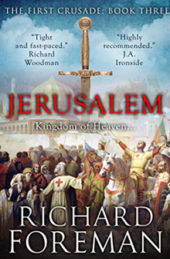What prompted you to choose the period that you wrote your first book in?
It was a toss up between Vikings and Romans. One day, around the time I started to make serious plans, I saw Bernard Cornwell’s first Uhtred book in the window of a Waterstones. I was so naïve about publishing that I thought his book meant I couldn’t go near Vikings, when in fact the opposite was true!
What is your approach to researching your novels? Has the process changed over the years?
As detailed and meticulous as I can make it. My knowledge about ancient Rome has grown over a fifteen year period, so it was like adding Lego blocks to a pre-existing model with each novel. It was a lot scarier for my first Lionheart novel (2020), because I had to (almost) start from scratch. I spent three months researching the 12th century before I even attempted to start writing. I then kept reading and reading and reading texts as I wrote the book…and hopefully, it worked!
Historical fiction is a great introduction to history. Can you recommend any historians to our readers to learn more about your period?
Tom Holland – Rubicon and Persian Fire. F.W. Walbank – Philip V of Macedon. Richard Miles – Carthage Must Be Destroyed. Adrian Murdoch – Rome’s Greatest Defeat. Barry Strauss – The Spartacus War.
What three pieces of advice would you give to a budding historical novelist, looking to write and publish their first book?
Write. Read as many novels as you can. Write every day.
If you could choose to meet any historical figure from your period, who would it be and why?
Hannibal Barca – because he is one of the greatest generals in history, whose tactics are still taught in military training colleges all over the world.
Similarly, if you could witness one event from history, what would it be and why?
Either the eruption of Vesuvius or the battle of Cannae – both from a safe distance!
Which other historical novelists do you admire?
Mary Renault – the goddess of historical fiction, and simply unparalleled. Rosemary Sutcliff – The Eagle of the Ninth is one of the reasons I write about Rome, and The Lantern Bearers is so terribly poignant. Sword at Sunset is the best telling of the Arthurian saga I have ever read.
When first sketching out an idea for a novel, which comes first – the protagonist, plot or history?
History, always history.
Do you have a daily routine as a writer? Also, how important is it to know other writers and have a support network?
Monday to Friday, office hours, like clockwork. That way I can see lots of my kids. Confession: coming near the end of a book, I often spend a lot more time writing than that.
Can you tell us about the project you are working on at the moment?
I have just finished the second Lionheart novel, Crusader, and have edited my 50000 word novella, Sands of the Arena, that I wrote on Facebook during lockdown. I’m talking to my publisher Orion about publishing it with my three previously self-published digital only novellas.






